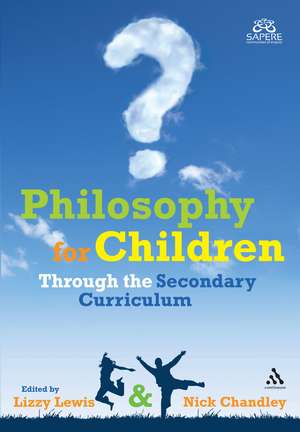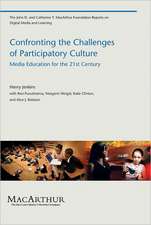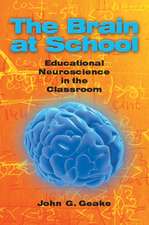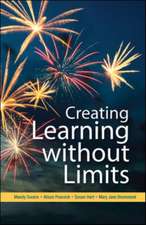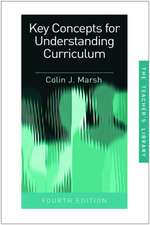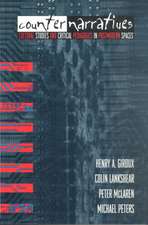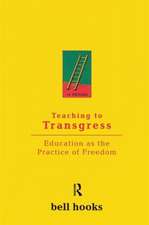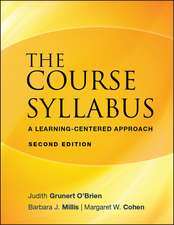Philosophy for Children Through the Secondary Curriculum
Editat de Lizzy Lewis, Nick Chandleyen Limba Engleză Paperback – 30 mai 2012
Preț: 127.96 lei
Preț vechi: 208.22 lei
-39% Nou
Puncte Express: 192
Preț estimativ în valută:
24.49€ • 26.59$ • 20.57£
24.49€ • 26.59$ • 20.57£
Carte tipărită la comandă
Livrare economică 22 aprilie-06 mai
Livrare express 15-21 martie pentru 107.70 lei
Preluare comenzi: 021 569.72.76
Specificații
ISBN-13: 9781441196613
ISBN-10: 1441196617
Pagini: 320
Dimensiuni: 169 x 244 x 18 mm
Greutate: 0.45 kg
Ediția:New.
Editura: Bloomsbury Publishing
Colecția Continuum
Locul publicării:London, United Kingdom
ISBN-10: 1441196617
Pagini: 320
Dimensiuni: 169 x 244 x 18 mm
Greutate: 0.45 kg
Ediția:New.
Editura: Bloomsbury Publishing
Colecția Continuum
Locul publicării:London, United Kingdom
Caracteristici
Includes a companion website with useful links and downloadable classroom resources that complement the book.
Notă biografică
Lizzy Lewis is the Development Manager at the Society for Advancing Philosophical Enquiry and Reflection in Education (SAPERE). Nick Chandley is a SAPERE Trainer and Editor of the SAPERE Level 1 Course Handbook.
Cuprins
Notes on Contributors Preface Introduction and Background to Philosophy for Children Steve Williams 1. Working with Concepts Steve Williams 2. Critical Thinking James Nottingham 3. P4C in English Language Steve Williams 4. P4C in English Literature Steve Williams5. P4C in Mathematics Rod Cunningam and John Smith 6. P4C in Science Lynda Dunlop 7. P4C in Religious Education (RE) Patricia Hannam 8. P4C in Personal, Social and Health Education (PSHE) Roger Sutcliffe 9. P4C in History Doug Paterson 10. P4C in Geography Dick Palfrey 11. P4C in Art Sara Liptai 12. P4C in Music Sara Liptai 13. P4C in Drama Neil Phillipson and Gordon Poad 14. P4C in Physical Education and School Sport (PESS) Paul Dearlove 15. P4C in Information and Communication Technology (ICT) Nick Chandley Appendix: A Brief History of P4C and SAPERE Index
Recenzii
Title mentioned in article in Sapere
'A pervasive environment of terror surrounding high stakes public exams has always made the secondary classroom a tough pitch for P4C enthusiasts. Drawing on the insights of subject specialists, this book nails the myth that there is a necessary contradiction between high-level performance in curriculum-centred domains of knowledge and the transferable skills, virtues and dispositions that are nurtured through P4C. In so doing, the contributors demonstrate that P4C has an invaluable role to play in showing curriculum subjects at their very best- as locations for the joy, mystery, discovery and, in Martha Graham's resonant phrase, 'divine dissatisfaction' that meaningful engagement in any domain can lead to. Whilst Bruner's claim that 'coverage is the enemy of understanding' has yet to be refuted, this text makes a complementary claim - that understanding is the friend of true enquiry.' Barry Hymer, Professor of Psychology in Education, Faculty of Education, University of Cumbria, UK
Whatever we teach, we need teach youngsters how to question the way the world works. This book gives teachers in every subject discipline the background, the approach and some examples. It bridges that gap between good ideas and learning theory. Enjoy thinking about what it means for your teaching approach.
One of the excuses often given for not teaching philosophy in schools is that there is no space for it in an already overcrowded curriculum. This book brilliantly demonstrates how every discipline in the national curriculum can be taught philosophically, using the methods of P4C. Each discipline has its own chapter, filled with detailed examples of how the methods can be applied. The result is not merely that philosophy finds its place, but that teaching methods will be dramatically improved across the board.
I recommend these materials for use in schools and welcome the commitment of the authors to requiring teachers to have some dedicated training in philosophy. The introduction and the first two chapters of the book root the practice of P4C in its philosophical grounds, and the materials lend themselves to developing what the authors call 'deliberate philosophising'. In particular their stress on building communities of practice is important. Currently schools are under pressure to focus on building individual children's core skills, which are assessed and reported. The dialogical 'skills' that these materials foster support the development of dispositions that are essential for children's integration into a wider social world, and for their own individual well-being. In this, the ability 'to think for themselves about values and the ends of life' is key. The individual subject chapters are thoughtful and informed and should prove useful and reliable for use in the classroom.
'A pervasive environment of terror surrounding high stakes public exams has always made the secondary classroom a tough pitch for P4C enthusiasts. Drawing on the insights of subject specialists, this book nails the myth that there is a necessary contradiction between high-level performance in curriculum-centred domains of knowledge and the transferable skills, virtues and dispositions that are nurtured through P4C. In so doing, the contributors demonstrate that P4C has an invaluable role to play in showing curriculum subjects at their very best- as locations for the joy, mystery, discovery and, in Martha Graham's resonant phrase, 'divine dissatisfaction' that meaningful engagement in any domain can lead to. Whilst Bruner's claim that 'coverage is the enemy of understanding' has yet to be refuted, this text makes a complementary claim - that understanding is the friend of true enquiry.' Barry Hymer, Professor of Psychology in Education, Faculty of Education, University of Cumbria, UK
Whatever we teach, we need teach youngsters how to question the way the world works. This book gives teachers in every subject discipline the background, the approach and some examples. It bridges that gap between good ideas and learning theory. Enjoy thinking about what it means for your teaching approach.
One of the excuses often given for not teaching philosophy in schools is that there is no space for it in an already overcrowded curriculum. This book brilliantly demonstrates how every discipline in the national curriculum can be taught philosophically, using the methods of P4C. Each discipline has its own chapter, filled with detailed examples of how the methods can be applied. The result is not merely that philosophy finds its place, but that teaching methods will be dramatically improved across the board.
I recommend these materials for use in schools and welcome the commitment of the authors to requiring teachers to have some dedicated training in philosophy. The introduction and the first two chapters of the book root the practice of P4C in its philosophical grounds, and the materials lend themselves to developing what the authors call 'deliberate philosophising'. In particular their stress on building communities of practice is important. Currently schools are under pressure to focus on building individual children's core skills, which are assessed and reported. The dialogical 'skills' that these materials foster support the development of dispositions that are essential for children's integration into a wider social world, and for their own individual well-being. In this, the ability 'to think for themselves about values and the ends of life' is key. The individual subject chapters are thoughtful and informed and should prove useful and reliable for use in the classroom.
